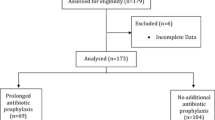Abstract.
Introduction: Surgical therapy of carcinoma of the esophagus or cardia by transthoracic esophageal resection is associated with a high morbidity in which nosocomial infections have a great importance. This study investigates the influence of prophylactic selective bowel decontamination on the course and results of transthoracic resection of the esophagus. Methods: Seventy patients with carcinoma of the esophagus and cardia were included in this prospective and partially randomized study at the University of Heidelberg. Twenty-five patients received prophylactically selective bowel decontamination with tobramycin, polymyxin B and amphotericin B. The treatment course was documented uniformly. In addition, micro-biological screening was performed by swab examinations of nose, throat and anus, by urine and blood cultures, and the documentation of results of additional microbiological diagnostic studies. Results: Bacteriological screening confirmed a reduction in infectious agents and a change of their spectrum in the respiratory and digestive tract without an increase in multiresistent bacteria. Patients who received selective bowel decontamination had a lower infection rate, a shorter artificial respiration period and a shorter intensive care stay without statistically significant differences. The mortality rate was 4 % vs 9 % in the control group (95 % confidence interval –0.172 – 0.116). Conclusion: This study confirms the feasibility and micro-biological effectiveness of selective bowel decontamination in the context of surgical therapy which is associated with a high nosocomial infection rate. The result of the clinical treatment seems slightly more favorable in the treatment group. Decisive are complications caused by surgery which fundamentally determine the clinical course and frequently cause infectious complications. The prophylactic use of selective bowel decontamination may be useful in patients with an increased risk of prolonged ventilation support or colon interposition but it is not to be generally recommended.
Zusammenfassung.
Einleitung: Die Resektion von Oesophagus- und Kardiacarcinomen im Rahmen eines Zweihöhleneingriffs ist mit einer hohen Morbidität verbunden, wobei nosokomiale Infektionen wesentliche Bedeutung besitzen. Diese Studie untersucht den Einfluss des prophylaktischen Einsatzes der selektiven Darmdekontamination (SDD) auf den Verlauf und die Ergebnisse der transthorakalen Oesophagusresektion. Methodik: An der Chirurgischen Universitätsklinik Heidelberg wurden 70 Patienten mit einer transthorakalen Oesophagus- und Kardiaresektion in diese prospektive teilrandomisierte Studie eingeschlossen. Prophylaktisch erhielten 25 Patienten im Aerodigestivtrakt eine SDD mit Tobramycin, Polymyxin B und Amphotericin B. Der Behandlungsverlauf wurde uniform dokumentiert. Zusätzlich erfolgte ein mikrobiologisches Screening durch Abstriche von Nase, Rachen, Anus und Urinkulturen sowie durch eine Dokumentation zusätzlicher mikrobiologischer Diagnostik. Ergebnisse: Das bakteriologische Screening belegte eine Veränderung und Reduktion des Spektrums untersuchter Keime im Aerodigestivtrakt ohne dass es zum vermehrten Auftreten multiresistenter Keime kam. Infektiöse Komplikationen traten in der SDD-Gruppe weniger häufig auf. Patienten mit SDD wurden früher extubiert und hatten eine kürzere intensivmedizinische Behandlung ohne dass diese Unterschiede statistisch signifikant waren. Die Letalität betrug in der SDD-Gruppe 4 % und in der Kontrollgruppe 9 % (95 % Konfidenzintervall –0,172 – 0,116). Schlussfolgerungen: Diese Studie belegt die Durchführbarkeit und mikrobiologische Wirksamkeit der SDD im Rahmen einer chirurgischen Therapie mit hohem nosokomialen Infektionsrisiko. Das klinische Behandlungsergebnis erscheint in der Therapiegruppe geringgradig günstiger. Richtungsgebend ist das Auftreten operationsbedingter Komplikationen, die den klinischen Verlauf wesentlich bestimmen und häufig infektionsbedingte Komplikationen zur Folge haben. Der prophylaktische Einsatz der SDD kann bei Patienten mit erhöhtem Risiko einer verlängerten postoperativen Beatmungstherapie oder mit Coloninterponat sinnvoll sein, ist jedoch nicht generell zu empfehlen.
Similar content being viewed by others
Author information
Authors and Affiliations
Rights and permissions
About this article
Cite this article
Riedl, S., Peter, B., Geiss, H. et al. Mikrobiologische und klinische Wirksamkeit der selektiven Darmdekontamination bei der transthorakalen Resektion von Oesophagus- und Kardiacarcinomen. Chirurg 72, 1160–1170 (2001). https://doi.org/10.1007/s001040170055
Issue Date:
DOI: https://doi.org/10.1007/s001040170055



